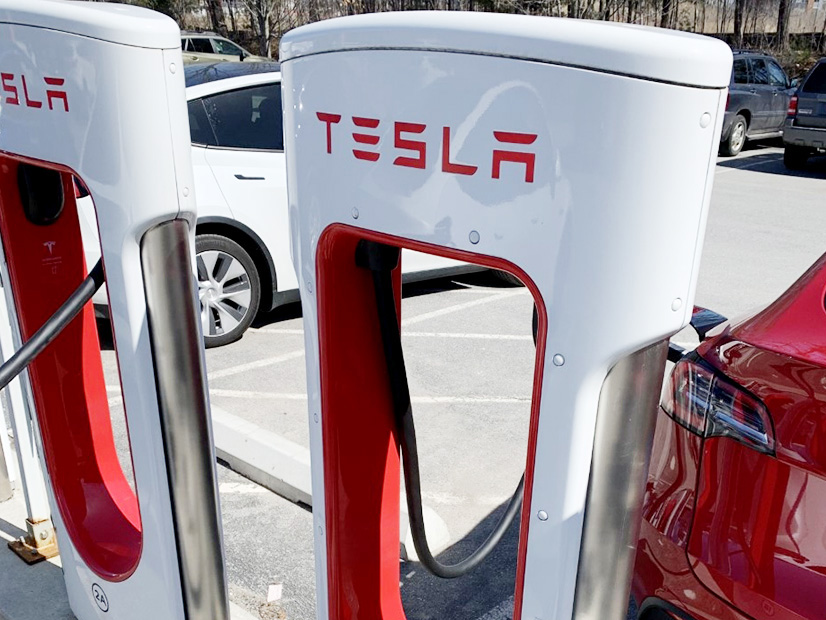
Lawmakers in Connecticut are taking another look at legislation that would allow auto manufacturers with an exclusive electric vehicle strategy to circumvent franchise law and sell directly to consumers in the state.
The bill (SB.214) “allows Connecticut to join 22 other states that allow all-EV-only, non-franchised manufacturers, like Rivian (NASDAQ:RVIN), Lucid (NASDAQ:LCID) and Tesla (NASDAQ:TSLA), to invest in brick-and-mortar dealerships in Connecticut,” said Kaitlin Monaghan, manager of public policy and senior counsel at Rivian.
EV-only companies would be subject to the same regulations as franchise dealers in the state under the law, if passed, according to Monaghan, who spoke Monday in support of the bill during a Transportation Committee hearing.
While current law in Connecticut requires auto manufacturers to sell their vehicles through a third-party dealership, the bill would allow the state to issue a dealer’s license to EV-only manufacturers. Under the bill, EV manufacturers would not be allowed to have a prior franchise agreement with a new car dealer or a controlling interest in or be owned by another licensed manufacturer.
“The bill allows Connecticut customers to choose the EV model and the EV purchasing experience they want,” Monaghan said. “A poll last year showed 83% of respondents support direct sales of EVs to consumers.”
A similar bill introduced in January 2021 gained some traction in the Connecticut legislature but did not pass the Senate before the end of the session. New York lawmakers are also considering a bill (S1763) that would alter dealer franchise law in the state in favor of EV manufacturer direct sales.
Recent auto sales statistics show that the presence of EV manufacturers with a direct sales approach is not hurting franchise dealerships, according to testimony by Daniel Witt, director of state and local public policy at Lucid.
“Dealers have been more profitable in the last two years than ever before,” Witt said. “That’s as Rivian and Lucid have started producing and delivering cars and as Tesla has sold more cars than ever before, globally.”
States that have allowed direct sales to customers have not lost jobs at dealerships, Kenneth Gillingham, a professor of economics at Yale University, said in testimony. “If there’s any impact at all, it’s not statistically distinguishable from zero.”
Connecticut EV owners, however, will have more money “in their pockets” because of lower costs on fuel and maintenance than for internal combustion vehicles, he said. That money, he added, will go toward in-state purchases that drive tax revenue.
Opponents of the bill in Connecticut say allowing the direct-sales model would establish two sets of rules for automobile competitors within the same market.
There is no law prohibiting Tesla, Rivian and Lucid from selling their vehicles in the state, as long as they “follow the same rules on automobile distribution that every other automaker is required to follow by law,” said Wayne Weikel, senior director of state affairs at the Alliance for Automotive Innovation, in testimony.
The franchise dealer model, however, does not work with Tesla’s approach to sales, according to testimony by Tesla Senior Policy Adviser Zach Kahn.
“By utilizing the direct-to-consumer sales model, Tesla has created a sales experience completely unlike the typical car buying experience in a dealership,” Kahn said. “We spend the time to educate our customers on the technology, answering countless questions about charging, battery performance and the like, and prepare them for electric vehicle ownership.”
Tesla’s call to change dealership laws was founded originally on its claim that the company was too small and its technology too new to compete in the existing market. But Weikel says that’s no longer the case.
An estimated 130 new EV models are due to hit the market by 2026, he said, and more companies are following in Tesla’s footsteps.
“Rivian and Lucid are asking for the same special treatment, but understand that there is a line of other startup companies right behind them,” he said.


